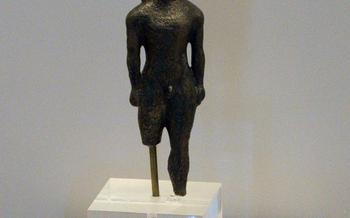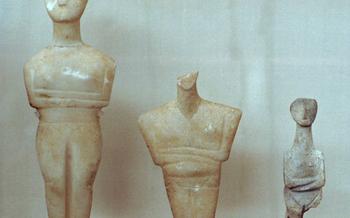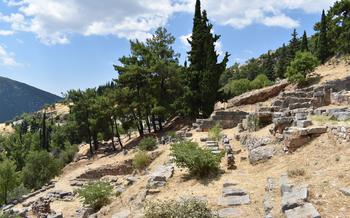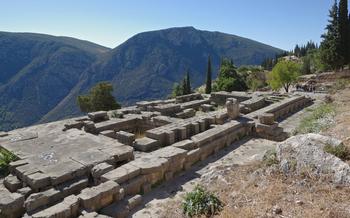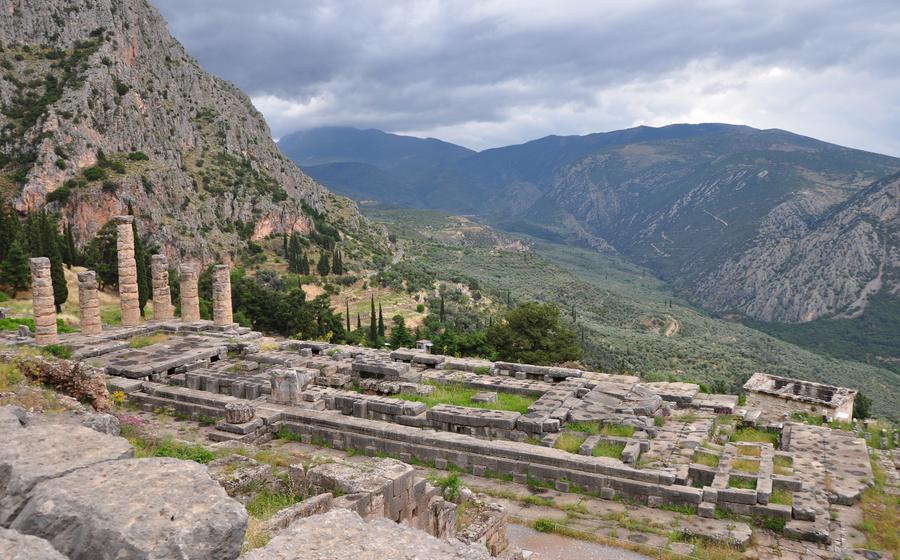
The Museum of the Olive and Greek Olive Oil in Sparta
- A Journey to Spartan Delights: Exploring the Museum of the Olive and Greek Olive Oil
- A Legacy Rooted in Antiquity: The History of Olive Cultivation in Sparta
- From Grove to Gold: The Art of Olive Oil Production
- A Sensory Symphony: Olive Oil Tasting and Appreciation
- The Olive Tree: A Symbol of Resilience and Longevity
- The Gift of Health: Unveiling the Health Benefits of Olive Oil
- A Culinary Odyssey: Olive Oil in Greek Cuisine
- Aromatic Treasures: Exploring the Different Varieties of Greek Olive Oil
- A Journey Through Time: The Museum's Historical Artifacts
- Interactive Exhibits: Engaging with the Museum's Hands-On Displays
- A Taste of Sparta: Olive Oil Tasting at the Museum
- Shopping for Olive Oil Souvenirs: The Museum's Gift Shop
- Planning Your Visit: Practical Information for a Smooth Experience
- Delving Deeper: Recommended Resources for Further Exploration
- Insider Tip: Uncovering a Hidden Gem
A Journey to Spartan Delights: Exploring the Museum of the Olive and Greek Olive Oil
In the heart of Sparta, a captivating journey unfolds at the Museum of the Olive and Greek Olive Oil. This haven of knowledge and sensory delights invites visitors to immerse themselves in the rich history, cultural significance, production methods, and exquisite flavors of olive oil, a liquid gold that has shaped the culinary, economic, and cultural landscape of Greece for millennia.
Step into the museum's welcoming embrace, and embark on an aromatic odyssey that unveils the ancient traditions and modern innovations that have shaped the world of olive oil. Discover the deep cultural roots of olives in Greek society, where they symbolize peace, abundance, and divine favor. Learn about the meticulous production process, from the careful harvesting of olives to the skillful extraction of their precious liquid essence. Engage your senses in an olive oil tasting experience, savoring the symphony of flavors and aromas that distinguish each variety.
Prepare to be captivated by the museum's interactive exhibits, where you can witness live demonstrations of traditional olive pressing techniques, explore the nuances of olive oil aromas and flavors at sensory stations, and test your knowledge through educational games and quizzes. Immerse yourself in the museum's collection of historical artifacts, encountering the tools and equipment used by ancient Spartans in olive cultivation and oil production. Admire the beautifully decorated amphorae that once held and transported this liquid treasure, and discover the depictions of olive trees and oil production in ancient Spartan art.
Whether you're a seasoned olive oil enthusiast or a curious newcomer, the Museum of the Olive and Greek Olive Oil promises an enriching and unforgettable journey into the heart of Spartan culinary traditions.
A Legacy Rooted in Antiquity: The History of Olive Cultivation in Sparta
Sparta's olive-growing heritage is deeply intertwined with its ancient past. The cultivation of olives in the region can be traced back to the 9th century BC, during the Mycenaean civilization. Archaeological evidence suggests that olive trees were extensively cultivated in the fertile valleys and hillsides surrounding Sparta, and olive oil played a vital role in the Spartan economy and culture.
Olive oil was a highly valued commodity in ancient Sparta, used not only for culinary purposes but also for lighting, cosmetics, and religious rituals. Its production and trade were strictly regulated by the Spartan government, which recognized the importance of this precious resource. The cultivation of olives and the production of olive oil became integral to the Spartan way of life and a source of pride for the Spartan people.
The olive tree held a deep symbolic meaning in Spartan culture, representing strength, resilience, and longevity. It was often associated with the goddess Athena, who was worshipped as the patron deity of Sparta. The olive wreath, made from the branches of the olive tree, was a symbol of victory and honor, bestowed upon athletes and warriors who achieved great feats.
From Grove to Gold: The Art of Olive Oil Production
Olive oil production in Sparta is a centuries-old tradition that has been passed down through generations. The process begins with the harvesting of olives, which takes place in the autumn months. Traditionally, olives were hand-picked, but today, modern mechanical harvesters are often used to speed up the process.
Once the olives have been harvested, they are taken to the mill to be processed. The first step is to clean the olives to remove any leaves or debris. The olives are then crushed into a paste using a traditional stone mill or a modern steel roller mill. The resulting paste is then mixed with water and churned to separate the oil from the solids.
The oil is then collected and allowed to settle. The top layer of oil is skimmed off and filtered to remove any impurities. The remaining oil is stored in stainless steel tanks or amphorae to preserve its quality and flavor.
Throughout the production process, strict quality controls are followed to ensure that the oil meets the highest standards. The oil is tested for its acidity, peroxide value, and other chemical parameters to ensure that it is free of defects and safe for consumption.
A Sensory Symphony: Olive Oil Tasting and Appreciation
Olive oil tasting is a journey of the senses, a symphony of flavors and aromas that awakens the palate. Begin by observing the oil's color and clarity. From shimmering gold to deep emerald green, each hue reveals a unique story.
Next, inhale deeply to capture the aroma. Fresh-cut grass, ripe fruit, and a hint of spice dance in harmony, creating a captivating bouquet. Swirl the oil gently in your mouth, allowing it to coat your taste buds and unleash a symphony of flavors—fruity, peppery, buttery, or a complex blend.
Savor the texture, from velvety smooth to a delicate tingle. Each variety offers a distinct sensation, adding depth and character to the tasting experience.
Finally, explore the art of pairing olive oil with food. Discover how the right oil can elevate the flavors of a simple salad, enhance the richness of grilled meats, or add a touch of elegance to desserts. Embrace the culinary journey, experimenting with different combinations to create harmonious and unforgettable taste experiences.
The Olive Tree: A Symbol of Resilience and Longevity
In Greek culture, the olive tree holds a profound symbolic significance, deeply entwined with mythology, history, and everyday life. The evergreen tree is revered as a symbol of peace, abundance, and wisdom, embodying the enduring spirit of the Greek people.
In ancient Greek mythology, the olive tree was sacred to the goddess Athena, who was believed to have gifted the first olive tree to the city of Athens. This divine connection further elevated the tree's status, making it a symbol of divine favor and protection.
The olive tree's remarkable longevity is another aspect that contributes to its symbolic value. These resilient trees can live for centuries, even millennia, standing as witnesses to the passage of time and the cyclical nature of life and renewal. Their ability to thrive in harsh conditions, withstanding droughts, strong winds, and rocky soil, further underscores their resilience and adaptability.
Beyond its symbolic meaning, the olive tree provides numerous environmental benefits. Its deep roots help prevent soil erosion, contributing to the preservation of precious topsoil. The tree's dense canopy provides shade, creating a microclimate that supports biodiversity and attracts various wildlife. Additionally, olive trees play a crucial role in carbon sequestration, helping mitigate the effects of climate change.
The Gift of Health: Unveiling the Health Benefits of Olive Oil
Olive oil is not just a culinary delight; it also holds a treasure trove of health benefits. Renowned for its heart-protective properties, olive oil has been shown to reduce the risk of cardiovascular diseases, including heart attacks and strokes. Its rich content of monounsaturated fats, particularly oleic acid, helps lower LDL (bad) cholesterol while raising HDL (good) cholesterol, promoting a healthy balance in the body.
Olive oil is also a potent source of antioxidants, which combat free radicals—unstable molecules that can damage cells and contribute to aging and various diseases. These antioxidants, including polyphenols and vitamin E, help neutralize free radicals, protecting cells from oxidative stress and reducing the risk of chronic diseases such as cancer.
Furthermore, olive oil plays a pivotal role in the Mediterranean diet, widely recognized for its health-promoting effects. The Mediterranean diet, characterized by an abundance of fresh fruits, vegetables, whole grains, and healthy fats like olive oil, has been linked to a lower incidence of heart disease, stroke, type 2 diabetes, and certain types of cancer.
Olive oil's health benefits are attributed to its unique composition of fatty acids, antioxidants, and other bioactive compounds. By incorporating olive oil into a balanced diet, individuals can reap the rewards of this liquid gold, promoting overall health and well-being.
A Culinary Odyssey: Olive Oil in Greek Cuisine
Olive oil is an indispensable ingredient in Greek cuisine, adding flavor and richness to a wide range of dishes. From traditional Greek stews and casseroles to fresh salads and grilled meats, olive oil enhances the flavors of every culinary creation.
In classic Greek dishes such as moussaka, pastitsio, and spanakopita, olive oil is used to sauté vegetables, fry potatoes, and add a golden crust to the top. It also features prominently in Greek salads, where it combines with lemon juice, oregano, and fresh vegetables to create a refreshing and flavorful dressing.
Olive oil is also a key ingredient in many Greek meze dishes and appetizers. It is drizzled over grilled halloumi cheese, used to marinate olives, and added to dips such as hummus and tzatziki. Its versatility makes it an essential condiment, adding a touch of Greece to any meal.
Whether you're enjoying a traditional Greek feast or simply snacking on meze and appetizers, olive oil is sure to be present, enhancing the flavors and adding a touch of authenticity to every bite.
Aromatic Treasures: Exploring the Different Varieties of Greek Olive Oil
Greece is blessed with a diverse range of olive oil varieties, each boasting its unique flavor profile and characteristics. The country's diverse climate, soil conditions, and olive tree cultivars contribute to this remarkable variety.
In Sparta, visitors can explore the different olive oil varieties produced in the region. From the fruity and peppery notes of the Koroneiki variety to the mild and buttery flavors of the Athinolia, each variety offers a distinct sensory experience.
The museum showcases the diverse range of Greek olive oils through interactive exhibits and tasting sessions. Visitors can learn about the different regions where each variety is cultivated and the factors that influence their unique flavor profiles.
One of the highlights of the museum is the opportunity to sample different olive oil varieties and compare their characteristics. Guided tasting sessions led by experts provide visitors with an in-depth understanding of the nuances of each oil.
By exploring the different varieties of Greek olive oil, visitors can gain a deeper appreciation for the rich flavors and traditions that make this liquid gold a beloved part of Greek cuisine and culture.
A Journey Through Time: The Museum's Historical Artifacts
Venturing into the museum's historical collection is akin to embarking on a journey through time, where visitors encounter a treasure trove of ancient artifacts that tell the story of olive cultivation and oil production in Sparta. Among these relics are the tools and equipment used by the ancient Spartans in their daily lives, providing a glimpse into their ingenuity and resourcefulness. Olive oil amphorae, beautifully decorated with intricate designs, stand as testaments to the importance of olive oil in ancient Spartan trade and commerce. Mosaics and frescoes adorn the walls, depicting scenes of olive harvesting, pressing, and oil storage, offering a vivid portrayal of the central role olive oil played in Spartan society. These artifacts serve as tangible links to the past, inviting visitors to immerse themselves in the rich history and traditions of Spartan olive oil production.
Interactive Exhibits: Engaging with the Museum's Hands-On Displays
The Museum of the Olive and Greek Olive Oil in Sparta offers a range of interactive exhibits that allow visitors to delve deeper into the world of olive oil production and appreciation. These hands-on displays provide a fun and engaging way to learn about the history, culture, and science behind this liquid gold.
One of the highlights of the museum is the live olive pressing demonstration. Here, visitors can witness the traditional process of extracting oil from olives, using the same techniques that have been employed for centuries. The demonstration provides a fascinating glimpse into the physical labor and craftsmanship involved in olive oil production.
The museum also features a series of sensory stations where visitors can explore the different aromas and flavors of olive oil. These interactive exhibits allow visitors to smell and taste a variety of olive oil samples, learning to identify the subtle nuances that distinguish each variety.
In addition, the museum offers educational games and quizzes that test visitors' knowledge about olive oil and its history. These interactive activities are a great way to engage with the museum's content and reinforce the information learned throughout the visit.
Whether you are a seasoned olive oil aficionado or a curious visitor eager to learn more about this culinary treasure, the interactive exhibits at the Museum of the Olive and Greek Olive Oil in Sparta offer a fun and educational experience for all.
A Taste of Sparta: Olive Oil Tasting at the Museum
The Museum of the Olive and Greek Olive Oil offers a unique opportunity for visitors to immerse themselves in the sensory experience of olive oil tasting. Guided tasting sessions, led by knowledgeable experts, provide an insightful journey through the diverse flavors and aromas of different olive oil varieties. Participants learn to identify the subtle nuances that distinguish each oil, appreciating the complexity and depth of this liquid gold.
For those who prefer a self-guided exploration, the museum offers a self-guided tasting experience, allowing visitors to explore the museum's collection of olive oils at their own pace. Interactive stations guide visitors through the process, providing information about each variety and its unique characteristics. Whether guided or self-guided, the olive oil tasting experience at the Museum of the Olive and Greek Olive Oil is an unforgettable immersion into the world of this liquid treasure.
Shopping for Olive Oil Souvenirs: The Museum's Gift Shop
The Museum of the Olive and Greek Olive Oil in Sparta houses a delightful gift shop that offers a treasure trove of olive oil-based products, inviting visitors to take home a taste of Spartan tradition. Browse the shelves and discover an array of locally produced olive oil soaps, each bar infused with the nourishing properties of this liquid gold. Treat your skin to the gentle caress of olive oil-based cosmetics, leaving it feeling silky smooth and rejuvenated. For culinary enthusiasts, the gift shop presents a tempting selection of gourmet specialties crafted with the finest Spartan olive oil, adding a touch of authentic Greek flavor to any kitchen.
Whether seeking unique gifts for friends and family or a special memento to remember your visit to Sparta, the museum's gift shop is a haven of olive oil treasures. Share the flavors and traditions of this ancient land with loved ones back home, gifting them a taste of the Mediterranean's culinary heritage.
Planning Your Visit: Practical Information for a Smooth Experience
To ensure a smooth and enjoyable visit to the Museum of the Olive and Greek Olive Oil in Sparta, it is essential to plan your trip carefully. The museum is conveniently located in the heart of Sparta, making it easily accessible by foot or public transportation.
Its operating hours vary depending on the season, so it is advisable to check the museum's website or contact them directly for the most up-to-date information. Admission fees are typically charged, but there may be discounts or concessions available for students, seniors, or groups. Guided tours are offered in various languages, providing an in-depth exploration of the museum's exhibits and the history of olive cultivation in Sparta.
Additionally, the museum offers a unique opportunity to taste and purchase a variety of high-quality olive oils from the region. Whether you are an olive oil enthusiast or simply curious about this liquid gold, the Museum of the Olive and Greek Olive Oil in Sparta is a must-visit destination that promises a memorable and enriching experience.
Delving Deeper: Recommended Resources for Further Exploration
To further immerse yourself in the world of olives and olive oil, consider exploring the following resources:
-
Books and Publications: Delve into the rich history and culture of olive cultivation and oil production in Sparta through books such as "The Olive in Greece: History, Culture, and Uses" by Paul Cartledge and "Olive Oil and the Mediterranean Diet: A Culinary Journey" by Nancy Harmon Jenkins.
-
Websites and Online Resources: Discover a wealth of information about olive oil and its significance in Greek culture on websites like the Olive Oil Times, the National Olive Oil Association, and the Greek Ministry of Agriculture.
-
Olive Oil Festivals and Events: Immerse yourself in the vibrant olive oil culture by attending festivals and events held in Sparta and other regions of Greece. These events often showcase local producers, offer olive oil tastings, and provide opportunities to learn more about the production process.
Insider Tip: Uncovering a Hidden Gem
The Olive Oil Route
For a truly immersive experience, embark on the Olive Oil Route, a picturesque road trip that winds through the heart of Sparta's olive-growing region. This scenic journey connects visitors with lush groves, traditional mills, and inviting tasting rooms, offering a unique opportunity to delve deeper into the world of olive oil and its significance in Spartan culture. Along the route, visitors can witness the ancient art of olive cultivation, learn about modern production techniques, and savor the exquisite flavors of freshly pressed olive oil. Whether you prefer to explore at your own pace or join a guided tour, the Olive Oil Route promises an unforgettable journey that will leave you with a newfound appreciation for the liquid gold of Sparta.



